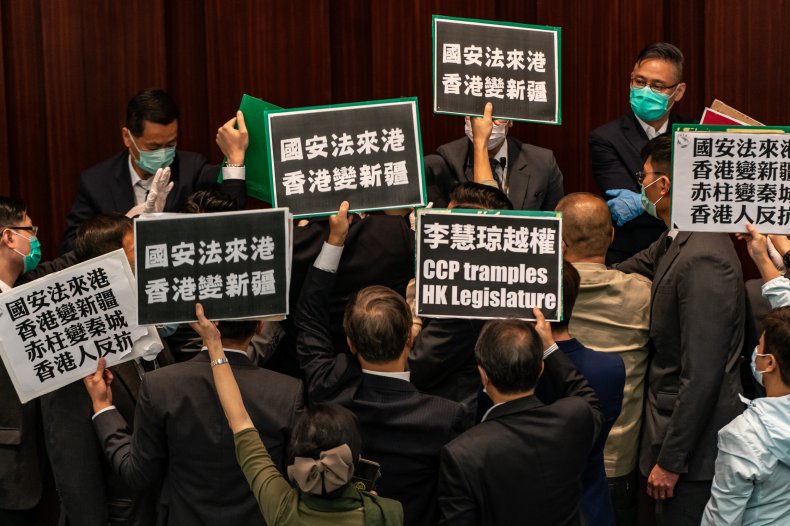
This article is more than
5 year oldChina has warned that it will retaliate against any American action relating to Hong Kong amid Beijing's plans to push through legislation banning dissent in the restive semi-autonomous region.
Foreign Ministry spokesperson Zhao Lijian told reporters at a daily briefing on Friday that no other nation would allow separatists to threaten national unity, after the U.S. criticized the proposed national security legislation.
Zhao said that while Beijing still seeks cooperation and dialogue with Washington, D.C., it would fight back if the U.S. tries to oppress China, Reuters reported.
The Hong Kong national security legislation is set to be approved at the annual meeting of the National People's Congress in Beijing this week, where top Chinese Communist Party officials meet to rubber stamp political and economic policy decided by leaders.
Ads by scrollerads.comIt comes after a year of turmoil in the former British colony. Mass protests erupted last summer over proposed legislation that would allow the extradition of criminal suspects to China.
Critics feared this would allow Beijing to persecute political dissidents living in Hong Kong, which under the "One country, two systems" agreement enjoys greater political freedoms than mainland provinces.
Millions of Hong Kong residents took to the streets to protest against the legislation, which was eventually shelved by pro-Beijing Chief Executive Carrie Lam. But the unrest lent momentum to pro-democracy groups, who demanded Lam's resignation and free and fair elections in Hong Kong.
Lam's government met the protests with force, deploying riot police—allegedly reinforced by mainland officers—to try and quell the dissent. For months, weekends in Hong Kong saw mass demonstrations and running battles with police.
Protests continued into 2020, but their momentum was degraded by the arrival of the coronavirus pandemic in Hong Kong. With the world preoccupied with the virus, Beijing is now set to pass legislation that would ban "treason, secession, sedition and subversion" in Hong Kong.
The new measures are expected to be agreed at the NPC this week, bypassing the regional Legislative Council which in recent days has become a chaotic battleground between pro-democracy and pro-Beijing officials.
Pro-democracy protesters in Hong Kong enjoyed bipartisan support from the U.S., where lawmakers passed the "Hong Kong Human Rights and Democracy Act," which allowed the U.S. to sanction those abusing human rights in the territory.
It also requires the State Department to confirm annually that the territory retains enough independence to justify favorable trading terms with the U.S. Beijing has consistently decried U.S. support for the protesters.
On Thursday, State Department spokesperson Morgan Ortagus said: "Any effort to impose national security legislation that does not reflect the will of the people of Hong Kong would be highly destabilizing, and would be met with strong condemnation from the United States and the international community."

Legislative Council on May 22, 2020 in Hong Kong, China.ANTHONY KWAN/GETTY IMAGES/GETTY |